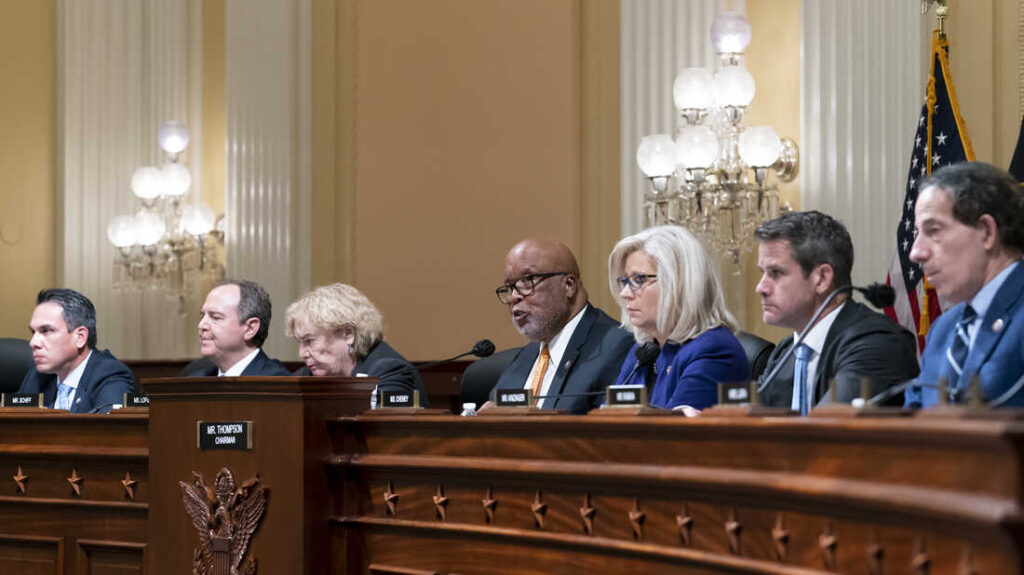
The Select Committee on Investigating the January 6th Attack on the United States Capitol revealed exclusive behind-the-scene information about the occurrences within the Trump Administration, including pressuring the vice president, state legislators and election officials and even attempting to influence the Department of Justice (DOJ) to alter the election results over eight public committee hearings.
Cassie Hutchinson, a former member of Trump’s White House staff, even recalled Trump’s aggressive emotional state when she testified that Trump tried to grab the steering wheel of a moving governmental vehicle and lunged for the collarbone of a secret security member when he told Trump he would not be able to march to the Capitol with his protestors.
The committee found that there were also efforts by the former president to coerce then-Vice President Mike Pence to reject the electoral votes during the January 6th Joint Session of Congress. Although the former vice president did not testify at the hearings, his former counsel, Greg Jacobs, did.
“There is no justifiable basis to conclude that the Vice President has that kind of authority,” Jacobs said.
Pence similarly outright rejected the proposal and communicated this to the President himself, then announced his stance in a public address at the Federalist Society Conference.
“President Trump said I had the right to overturn the election, but President Trump was wrong. I had no right to overturn the election. The presidency belongs to the American people, and the American people alone. And frankly, there is no idea more un-American than the notion that any one person could choose the American president,” Pence said.
Trump concurrently brought allegations of voting fraud on Nov. 4, 2020 claiming pollsters were counting additional ballots for President Biden in Georgia, large numbers of unregistered immigrants and deceased people were voting in Arizona and other baseless claims in the key battleground states of Michigan, Wisconsin, Pennsylvania and Nevada.
President Trump looked to the state of Georgia, which he lost to then President-elect Biden, and called Georgia Secretary of State Brad Raffensperger and told him to, “find 11,780” votes in his favor. The Georgia Secretary denied the request outright.
In Arizona, the Trump campaign pressured Arizona State House Speaker Rusty Bowers to go into a special session to declare President Trump the winner of the 2020 election, decertify Joe Biden as the winner of the state and send two elector slates to Congress, one certified by the state declaring Biden the winner, and a fraudulent one declaring Trump the winner.
“It would violate the oath, the basic principles of republican government, and the rule of law if we attempted to nullify the people’s vote based on unsupported theories of fraud,” Bowers said in a press statement.
President Trump then turned to the DOJ to intervene in the election for a more favorable outcome, threatening historical precedent. Acting Attorney General Jeffery Rosen and Richard Donoghue became Deputy Attorney General of the DOJ after the resignation of William Barr on Dec.14, 2020. However, the two highest-ranking officials in the DOJ did not find any evidence of election fraud alleged by Trump.
“Sir, we’ve done dozens of investigations, hundreds of interviews, and the major allegations are not supported by the evidence developed. We’ve looked in Georgia, Pennsylvania, Michigan, and Nevada. We’re doing our job. Much of the info you’re getting is false,” former Deputy Attorney General Richard Donoghue said.
The President conceded to stop pressuring the DOJ when various high-ranking officials threatened to resign.
The investigation is still ongoing, but there is a wealth of evidence that Trump attempted to manipulate the outcome of the election before the riot, which causes great concern regarding the legitimacy of the U.S. democracy as well as ramifications for conducting an efficient election process in the future.
Copy edited by Chanice McClover-Lee









